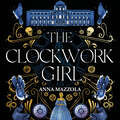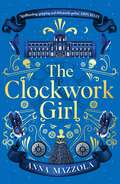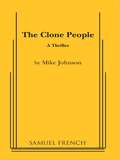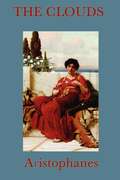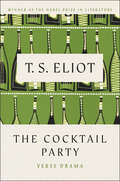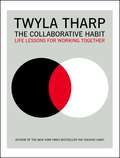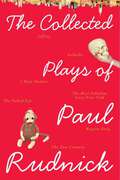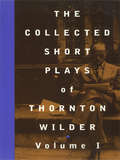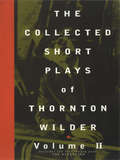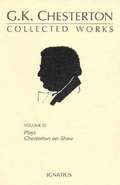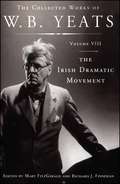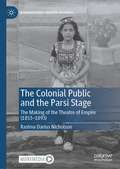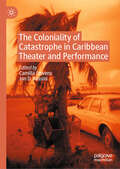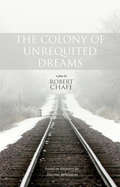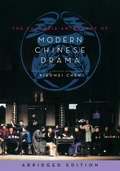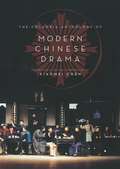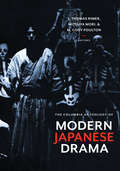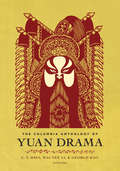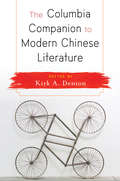- Table View
- List View
The Clockwork Girl
by Anna MazzolaParis, 1750. In the midst of an icy winter, as birds fall frozen from the sky, chambermaid Madeleine Chastel arrives at the home of the city's celebrated clockmaker and his clever, unworldly daughter. Madeleine is hiding a dark past, and a dangerous purpose: to discover the truth of the clockmaker's experiments and record his every move, in exchange for her own chance of freedom. For as children quietly vanish from the Parisian streets, rumours are swirling that the clockmaker's intricate mechanical creations, bejewelled birds and silver spiders, are more than they seem. And soon Madeleine fears that she has stumbled upon an even greater conspiracy. One which might reach to the very heart of Versailles... A intoxicating story of obsession, illusion and the price of freedom.
The Clockwork Girl: The captivating and hotly-anticipated mystery you won’t want to miss in 2022!
by Anna Mazzola'Evocative, chilling, compelling' TAMMY COHEN'Breathtakingly good' ABIR MUKHERJEE'Kept me guessing until the end. An absolute masterpiece' JENNIFER SAINT'A deliciously dark historical novel of thrilling originality' ESSIE FOX'Spellbinding, gripping, immersive and deliciously gothic' ERIN KELLYParis, 1750.In the midst of an icy winter, as birds fall frozen from the sky, chambermaid Madeleine Chastel arrives at the home of the city's celebrated clockmaker and his clever, unworldly daughter. Madeleine is hiding a dark past, and a dangerous purpose: to discover the truth of the clockmaker's experiments and record his every move, in exchange for her own chance of freedom.For as children quietly vanish from the Parisian streets, rumours are swirling that the clockmaker's intricate mechanical creations, bejewelled birds and silver spiders, are more than they seem.And soon Madeleine fears that she has stumbled upon an even greater conspiracy. One which might reach to the very heart of Versailles...A intoxicating story of obsession, illusion and the price of freedom.
The Clone People: Hollywood Finish
by Mike JohnsonAll Groups / Thriller / 4 m., 5 f. / Interior / Jay Westcott and Nessa Paxton are two of Hollywood's most successful stars and a happily married couple. While filming on location, Nessa sustains an accidental blow on the head and flees to her home in Beverly Hills before anxious studio staff members can stop her. She bursts in on Jay and, nearly incoherent with hysteria, insists she is really Polly Ackerman, a girl who vanished just before their marriage. Jay fears for her sanity and, over her protests, he allows the studio to find her and provide medical help. Several strange events make him suspect she might be telling the truth and that something incredibly evil is going on at the studio where he may be the next victim. For an evening of plausible nightmare, suspense and breathtaking terror with a shocking surprise ending this show can't be excelled.
The Clouds
by AristophanesSocrates' "Thinkery" is at the center of Clouds, which spoofs untraditional techniques for educating young men.
The Cocktail Party: Verse Drama
by T. S. EliotA comedic play about the universal quest for meaning, written in some of Eliot's "most beautiful poetry" (The New York Times). A sterling example of contemporary theater, The Cocktail Party is a dramatic tour de force from one of our greatest writers to date.
The Collaborative Habit: Life Lessons for Working Together
by Jesse Kornbluth Twyla TharpIn a career that has spanned four decades, choreographer Twyla Tharp has collaborated with great musicians, designers, thousands of dancers, and almost a hundred companies. She's experienced the thrill of shared achievement and has seen what happens when group efforts fizzle. Her professional life has been -- and continues to be -- one collaboration after another. In this practical sequel to her national bestseller The Creative Habit, Tharp explains why collaboration is important to her -- and can be for you. She shows how to recognize good candidates for partnership and how to build one successfully, and analyzes dysfunctional collaborations. And although this isn't a book that promises to help you deepen your romantic life, she suggests that the lessons you learn by working together professionally can help you in your personal relationships. These lessons about planning, listening, organizing, troubleshooting, and using your talents and those of your coworkers to the fullest are not limited to the arts; they are the building blocks of working with others, like if you're stuck in a 9-to-5 job and have an unhelpful boss. Tharp sees collaboration as a daily practice, and her book is rich in examples from her career. Starting as a twelve-year-old teaching dance to her brothers in a small town in California and moving through her work as a fledgling choreographer in New York, she learns lessons that have enriched her collaborations with Billy Joel, Jerome Robbins, Mikhail Baryshnikov, Bob Dylan, Elvis Costello, David Byrne, Richard Avedon, Milos Forman, Norma Kamali, and Frank Sinatra. Among the surprising and inspiring points Tharp makes in The Collaborative Habit: -Nothing forces change more dramatically than a new partnership. -In a good collaboration, differences between partners mean that one plus one will always equal more than two. A good collaborator is easier to find than a good friend. If you've got a true friendship, you want to protect that. To work together is to risk it. -Everyone who uses e-mail is a virtual collaborator. -Getting involved with your collaborator's problems may distract you from your own, but it usually leads to disaster. -When you have history, you have ghosts. If you're returning to an old collaboration, begin at the beginning. No evocation of old problems and old solutions. -Tharp's conclusion: What we can learn about working creatively and in harmony can transform our lives, and our world.
The Collected Plays of Paul Rudnick
by Paul RudnickThe definitive collection of theatrical hilarity by one of America’s preeminent playwrights and humoristsThe New York Times has proclaimed that “line by line, Mr. Rudnick may be the funniest writer for the stage in the United States today.” Now, this collection of his plays will remind readers far and wide of the great influence that Paul Rudnick’s comic genius has had on the world of American theater.Here are I Hate Hamlet, the play that marked Rudnick’s Broadway debut; Jeffrey, the long-running off-Broadway smash about gay life during the AIDS crisis of the early ’90s; as well as five other onstage gems enlivened by Rudnick’s signature rapier wit.The Collected Plays of Paul Rudnick is a must-have item for any fan of this theatrical master—and a necessary addition to all courses in dramatic literature.
The Collected Short Plays of Thornton Wilder, Volume O
by Thornton Wilder John GuareThornton Wilder, author of such landmark works for the stage as Our Town and The Skin of Our Teeth as well as the classic novel The Bridges of San Luis Rey is considered one of America's greatest man of letters. This two volume publication collects the complete short works for the stage, including a never-before-published one act play.
The Collected Short Plays of Thornton Wilder, Volume T
by Thornton WilderThe publication of volume two of this landmark collection celebrates the close of the centennial year of Thornton Wilder's birth. This volume collects 17 plays from the author's three-minute and five-minute plays for five actors series and includes the full-length play The Alcestiad, a major work by the author of Our Town and The Skin of Our Teeth which has long been unavailable.
The Collected Works of G. K. Chesterton XI: Plays and Chesterton on Shaw
by G. K. Chesterton Dennis J. ConlonThis volume includes the collected plays of G. K. Chesterton, his controversial writings on Bernard Shaw (who referred to GKC as a colossal genius), and a bibliography.
The Collected Works of W.B. Yeats Volume VIII: The Irish Dramatic Movement
by Richard J. Finneran William Butler Yeats Mary FitzgeraldThe Collected Works of W. B. Yeats, Volume VIII: The Irish Dramatic Movement is part of a fourteen-volume series under the general editorship of eminent Yeats scholars Richard J. Finneran and George Mills Harper. This complete edition includes virtually all of the Nobel laureate's published work, in authoritative texts and with extensive explanatory notes. Edited by the distinguished Yeats scholars Mary FitzGerald and Richard J. Finneran, The Irish Dramatic Movement gathers together -- for the first time -- all of the poet's time-honored essays on drama and the groundbreaking movement that led to the enduring Irish theater of today. Although the reputation of W. B. Yeats as one of the preeminent writers of the twentieth century rests primarily on his poetry, drama and the theatre were among his abiding concerns. Indeed, in 1917 he wrote, "I need a theatre; I believe myself to be a dramatist." Here in this volume is the collection of all his major dramatic criticism for the years 1899-1919, including previously uncollected material. A practicing dramatist himself, Yeats had strong convictions about the goals of the Irish theater and the appropriate plays to be produced. The essays in this collection address many topics, from the turbulent early years of what became the Abbey Theatre to the controversies over the plays of John Millington Synge and the relationship between drama and nationalism. Also evident are Yeats's judgments on numerous plays, playwrights, and productions, both in Irish and in English. FitzGerald and Finneran's volume includes an Introduction and a History of the Text, as well as copious but unobtrusive annotation. The Irish Dramatic Movement is an essential volume for both readers of Yeats and students of the early years of twentieth-century theater.
The Colonial Public and the Parsi Stage: The Making of the Theatre of Empire (1853-1893) (Transnational Theatre Histories)
by Rashna Darius NicholsonThe Colonial Public and the Parsi Stage is the first comprehensive study of the Parsi theatre, colonial South and Southeast Asia’s most influential cultural phenomenon and the precursor of the Indian cinema industry. By providing extensive, unpublished information on its first actors, audiences, production methods, and plays, this book traces how the theatre—which was one of the first in the Indian subcontinent to adopt European stagecraft—transformed into a pan-Asian entertainment industry in the second half of the nineteenth century. Nicholson sheds light on the motivations that led to the development of the popular, commercial theatre movement in Asia through three areas of investigation: the vernacular public sphere, the emergence of competing visions of nationhood, and the narratological function that women served within a continually shifting socio-political order. The book will be of interest to scholars across several disciplines, including cultural history, gender studies, Victorian studies, the sociology of religion, colonialism, and theatre.
The Coloniality of Catastrophe in Caribbean Theater and Performance
by Camilla Stevens Jon D. RossiniThe Coloniality of Catastrophe in Caribbean Theater and Performance calls attention to theater&’s capacity to reveal the constructed roots of catastrophe and offer counter catastrophic strategies to live and imagine otherwise. Engaging anglophone, francophone, and hispanophone theater from across the Caribbean and its diaspora, the 12 essays and one interview foster a pan-Caribbean view of theater, identifying shared tropes and theatrical strategies. Essays address a range of 20th and 21st century works that center the relentless cycle of &“natural&” disasters such as earthquakes, hurricanes, and floods as well as the catastrophic effects of continuing coloniality more broadly. In doing so, they unsettle the normalization of catastrophe. Exploring the power of theater&’s situatedness, its iterative quality, and its special arrangement of time, these works remind us of the impact of embodied co-presence in the political realities of everyday life.
The Colony of Unrequited Dreams
by Robert ChafeSpanning two decades, Smallwood’s story is anchored and propelled by one of Johnston’s most memorable creations: the fictitious Sheilagh Fielding, a caustic newspaper columnist whose own battles with the past and alcohol addiction find full vent and expression in her tireless dogging of Smallwood’s climb to power. At its heart, The Colony of Unrequited Dreams is the story of a man whose career is buoyed and sometimes sunk by his unresolved feelings for a woman he never allowed himself to love. It is also the story of Newfoundland’s final years as a country, the end of one cultural and political trajectory, and the beginning of another.
The Columbia Anthology of Modern Chinese Drama
by Xiaomei ChenThe first of its kind in English, this anthology translates twenty-two popular Chinese plays published between 1919 and 2000, accompanied by a critical introduction to the historical, cultural, and aesthetic evolution of twentieth-century Chinese spoken drama. Primarily comprising works from the People's Republic of China, though including representative plays from Hong Kong and Taiwan, this collection not only showcases the revolutionary rethinking of Chinese theater and performance that began in the late Qing dynasty. It also highlights the formation of Chinese national and gender identities during a period of tremendous social and political change, along with the genesis of contemporary attitudes toward the West. Early twentieth-century Chinese drama embodies the uncertainty and anxiety brought on by modernism, socialism, political conflict, and war. After 1949, PRC theater painted a complex portrait of the rise of communism in China, with the ideals of Chinese socialism juxtaposed against the sacrifices made for a new society. The Cultural Revolution promoted a "model theater" cultivated from the achievements of earlier, leftist spoken drama, even though this theater arose from the destruction of old culture. Post-Mao drama addresses the socialist legacy and the attempts of a wounded nation to reexamine its cultural roots. Taiwan's spoken drama synthesizes regional and foreign traditions, and Hong Kong's spoken drama sparkles as a hybrid of Chinese and Western influences. Immensely valuable for cross-disciplinary, comparative, and performance study, this anthology provides essential perspective on China's theatricality and representation of political life.
The Columbia Anthology of Modern Chinese Drama
by Xiaomei ChenThe first of its kind in English, this anthology presents translations of twenty-two popular plays published between 1919 and 2000, accompanied by an introduction to the historical, cultural, and aesthetic evolution of twentieth-century Chinese spoken drama. Primarily comprising works from the People's Republic of China, though including representative plays from Hong Kong and Taiwan, this collection showcases more than the revolutionary rethinking of Chinese theater and performance that began in the late Qing dynasty. It also reflects the formation of Chinese national and gender identities during a period of tremendous social and political change, as well as the genesis of contemporary attitudes toward the West.Early twentieth-century Chinese drama embodies the uncertainty and anxiety brought on by modernism, socialism, political conflict, and war. After 1949, the PRC theater paints a complex portrait of the rise of Communism in China, with the ideals of Chinese socialism juxtaposed against the sacrifices made for a new society. The Cultural Revolution promoted a "model theater" cultivated from the achievements of earlier, leftist spoken drama, despite the fact that this theater arose from the destruction of old culture. Post-Mao drama addresses the Chairman's legacy and the attempts of a wounded nation to reexamine its cultural roots. Taiwan's spoken drama uniquely synthesizes regional and foreign traditions, and Hong Kong's spoken drama sparkles as a hybrid of Chinese and Western influences. Immensely valuable for scholars of cross-disciplinary, comparative, and performance study, this anthology offers essential perspective on the theatricality and representation of political life.
The Columbia Anthology of Modern Chinese Drama (Weatherhead Books on Asia)
by Ed. Chen XiaomeiThe first of its kind in English, this anthology translates twenty-two popular Chinese plays published between 1919 and 2000, accompanied by a critical introduction to the historical, cultural, and aesthetic evolution of twentieth-century Chinese spoken drama. Primarily comprising works from the People's Republic of China, though including representative plays from Hong Kong and Taiwan, this collection not only showcases the revolutionary rethinking of Chinese theater and performance that began in the late Qing dynasty. It also highlights the formation of Chinese national and gender identities during a period of tremendous social and political change, along with the genesis of contemporary attitudes toward the West.Early twentieth-century Chinese drama embodies the uncertainty and anxiety brought on by modernism, socialism, political conflict, and war. After 1949, PRC theater painted a complex portrait of the rise of communism in China, with the ideals of Chinese socialism juxtaposed against the sacrifices made for a new society. The Cultural Revolution promoted a "model theater" cultivated from the achievements of earlier, leftist spoken drama, even though this theater arose from the destruction of old culture. Post-Mao drama addresses the socialist legacy and the attempts of a wounded nation to reexamine its cultural roots. Taiwan's spoken drama synthesizes regional and foreign traditions, and Hong Kong's spoken drama sparkles as a hybrid of Chinese and Western influences. Immensely valuable for cross-disciplinary, comparative, and performance study, this anthology provides essential perspective on China's theatricality and representation of political life.
The Columbia Anthology of Modern Chinese Drama: abridged edition (Weatherhead Books on Asia)
by Xiaomei ChenThis condensed anthology reproduces close to a dozen plays from Xiaomei Chen's well-received original collection, The Columbia Anthology of Modern Chinese Drama, along with her critical introduction to the historical, cultural, and aesthetic evolution of twentieth-century Chinese spoken drama. Comprising representative works from the Republican era to postsocialist China, the book encapsulates the revolutionary rethinking of Chinese theater and performance that began in the late Qing dynasty and vividly portrays the uncertainty and anxiety brought on by modernism, socialism, political conflict, and war. Chosen works from 1919 to 1990 also highlight the formation of national and gender identities during a period of tremendous social, cultural, and political change in China and the genesis of contemporary attitudes toward the West. PRC theater tracks the rise of communism, juxtaposing ideals of Chinese socialism against the sacrifices made for a new society. Post-Mao drama addresses the nation's socialist legacy, its attempt to reexamine its cultural roots, and postsocialist reflections on critical issues such as nation, class, gender, and collective memories. An essential, portable guide for easy reference and classroom use, this abridgment provides a concise yet well-rounded survey of China's theatricality and representation of political life. The original work not only established a canon of modern Chinese drama in the West but also made it available for the first time in English in a single volume.
The Columbia Anthology of Modern Japanese Drama
by J. Thomas M. Cody Poulton Mori Rimer MitsuyaThis anthology is the first to survey the full range of modern Japanese drama and make available Japan's best and most representative twentieth- and early-twenty-first-century works in one volume. It opens with a comprehensive introduction to Meiji-period drama and follows with six chronological sections: "The Age of Taisho Drama"; The Tsukiji Little Theater and Its Aftermath"; "Wartime and Postwar Drama"; "The 1960s and Underground Theater"; "The 1980s and Beyond"; and "Popular Theater," providing a complete history of modern Japanese theater for students, scholars, instructors, and dramatists. The collection features a mix of original and previously published translations of works, among them plays by such writers as Masamune Hakucho (The Couple Next Door), Enchi Fumiko (Restless Night in Late Spring), Morimoto Kaoru (A Woman's Life), Abe Kobo (The Man Who Turned into a Stick), Kara Juro (Two Women), Terayama Shuji (Poison Boy), Noda Hideki (Poems for Sale), and Mishima Yukio (The Sardine Seller's Net of Love). Leading translators include Donald Keene, J. Thomas Rimer, M. Cody Poulton, John K. Gillespie, Mari Boyd, and Brian Powell. Each section features an introduction to the developments and character of the period, notes on the plays' productions, and photographs of their stage performances. The volume complements any study of modern Japanese literature and modern drama in China, Korea, or other Asian or contemporary Western nations.
The Columbia Anthology of Modern Japanese Drama
by J. Thomas Rimer M. Cody Poulton Mitsuya MoriThis anthology is the first to survey the full range of modern Japanese drama and make available Japan's best and most representative twentieth- and early-twenty-first-century works in one volume. Divided into six chronological sections: "The Age of Taisho Drama"; The Tsukiji Tsukiji Little Theater and Its Aftermath"; "Wartime and Postwar Drama"; "The 1960s and Underground Theater"; "The 1980s and Beyond"; and "Popular Theater," the collection opens with a comprehensive introduction to Meiji period drama and provides an informal yet complete history of twentieth-century Japanese theater for students, scholars, instructors, and dramatists. The collection features a mix of original and previously published translations of works, among them plays by such writers as Masamune Hakucho (The Couple Next Door), Enchi Fumiko (Restless Night in Late Spring), Abe Kobo (The Man Who Turned into a Stick), Morimoto Kaoru (A Woman's Life), Kara Juro (Two Women), Terayama Shuji (Poison Boy), Noda Hideki (Poems for Sale), and Mishima Yukio (The Sardine Seller's Net of Love). Leading translators include Donald Keene, J. Thomas Rimer, Mitsuyra Mori, M. Cody Poulton, John Gillespie, Mari Boyd, and Brian Powell. Each section features an introduction to the developments and character of the period, notes on the plays' productions, and photographs of their stage performances. The volume complements any course on modern Japanese literature and any study of modern drama in China, Korea, or other Asian or contemporary Western nation.
The Columbia Anthology of Modern Japanese Drama
by J. Thomas Rimer M. Cody Poulton Mitsuya MoriThis anthology is the first to survey the full range of modern Japanese drama and make available Japan's best and most representative twentieth- and early-twenty-first-century works in one volume. Divided into six chronological sections: "The Age of Taisho Drama"; The Tsukiji Tsukiji Little Theater and Its Aftermath"; "Wartime and Postwar Drama"; "The 1960s and Underground Theater"; "The 1980s and Beyond"; and "Popular Theater," the collection opens with a comprehensive introduction to Meiji period drama and provides an informal yet complete history of twentieth-century Japanese theater for students, scholars, instructors, and dramatists. The collection features a mix of original and previously published translations of works, among them plays by such writers as Masamune Hakucho (The Couple Next Door), Enchi Fumiko (Restless Night in Late Spring), Abe Kobo (The Man Who Turned into a Stick), Morimoto Kaoru (A Woman's Life), Kara Juro (Two Women), Terayama Shuji (Poison Boy), Noda Hideki (Poems for Sale), and Mishima Yukio (The Sardine Seller's Net of Love). Leading translators include Donald Keene, J. Thomas Rimer, Mitsuyra Mori, M. Cody Poulton, John Gillespie, Mari Boyd, and Brian Powell. Each section features an introduction to the developments and character of the period, notes on the plays' productions, and photographs of their stage performances. The volume complements any course on modern Japanese literature and any study of modern drama in China, Korea, or other Asian or contemporary Western nation.
The Columbia Anthology of Yuan Drama
by George Kao C. T. Hsia Wai-Yee LiThis anthology features translations of ten seminal plays written during the Yuan dynasty (1279--1368), a period considered the golden age of Chinese theater. By turns lyrical and earthy, sentimental and ironic, Yuan drama spans a broad emotional, linguistic, and stylistic range. Combining sung arias with declaimed verses and doggerels, dialogues and mime, and jokes and acrobatic feats, Yuan drama formed a vital part of China's culture of performance and entertainment in the thirteenth and fourteenth centuries.To date, few Yuan-dynasty plays have been translated into English. Well-known translators and scholars have supervised the making of this collection and add a short description to each play. A general introduction situates all selections within their cultural and historical contexts.
The Columbia Anthology of Yuan Drama (Translations from the Asian Classics)
by Hsia C. T. Li George Kao Wai-YeeThis anthology features translations of ten seminal plays written during the Yuan dynasty (1279–1368), a period considered the golden age of Chinese theater. By turns lyrical and earthy, sentimental and ironic, Yuan drama spans a broad emotional, linguistic, and stylistic range. Combining sung arias with declaimed verses and doggerels, dialogues and mime, and jokes and acrobatic feats, Yuan drama formed a vital part of China's culture of performance and entertainment in the thirteenth and fourteenth centuries.To date, few Yuan-dynasty plays have been translated into English. Well-known translators and scholars have supervised the making of this collection and add a short description to each play. A general introduction situates all selections within their cultural and historical contexts.
The Columbia Companion to Modern Chinese Literature
by Kirk A. DentonThe Columbia Companion to Modern Chinese Literature features more than fifty short essays on specific writers and literary trends from the Qing period (1895–1911) to the present. The volume opens with thematic essays on the politics and ethics of writing literary history, the formation of the canon, the relationship between language and form, the role of literary institutions and communities, the effects of censorship, the representation of the Chinese diaspora, the rise and meaning of Sinophone literature, and the role of different media in the development of literature. Subsequent essays focus on authors, their works, and the schools with which they were aligned, featuring key names, titles, and terms in English and in Chinese characters. Woven throughout are pieces on late Qing fiction, popular entertainment fiction, martial arts fiction, experimental theater, post-Mao avant-garde poetry, post–martial law fiction from Taiwan, contemporary genre fiction from China, and recent Internet literature. The volume includes essays on such authors as Liang Qichao, Lu Xun, Shen Congwen, Eileen Chang, Jin Yong, Mo Yan, Wang Anyi, Gao Xingjian, and Yan Lianke. Both a teaching tool and a go-to research companion, this volume is a one-of-a-kind resource for mastering modern literature in the Chinese-speaking world.
